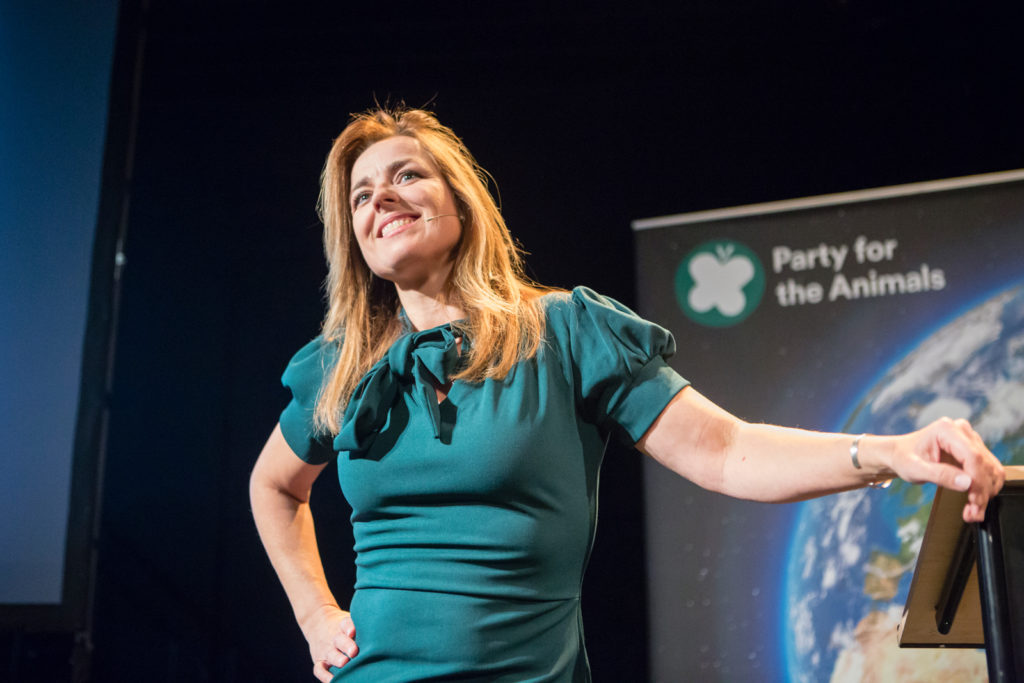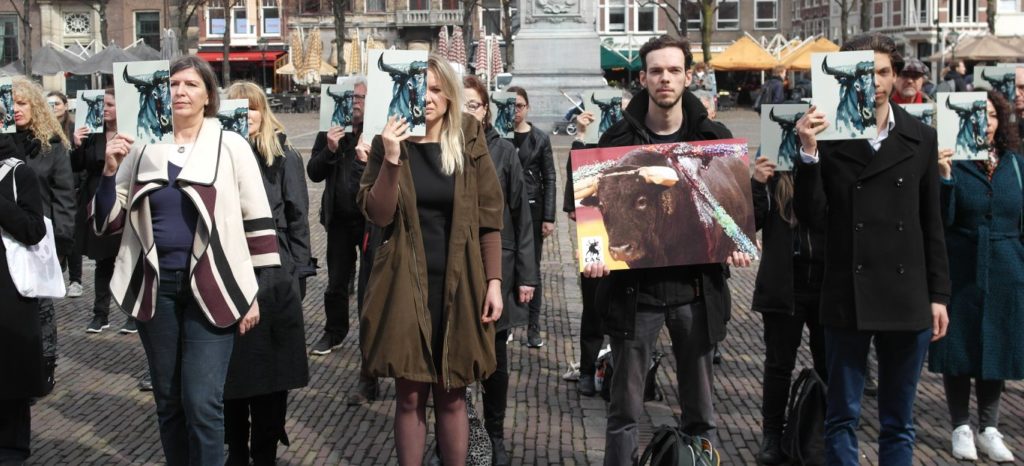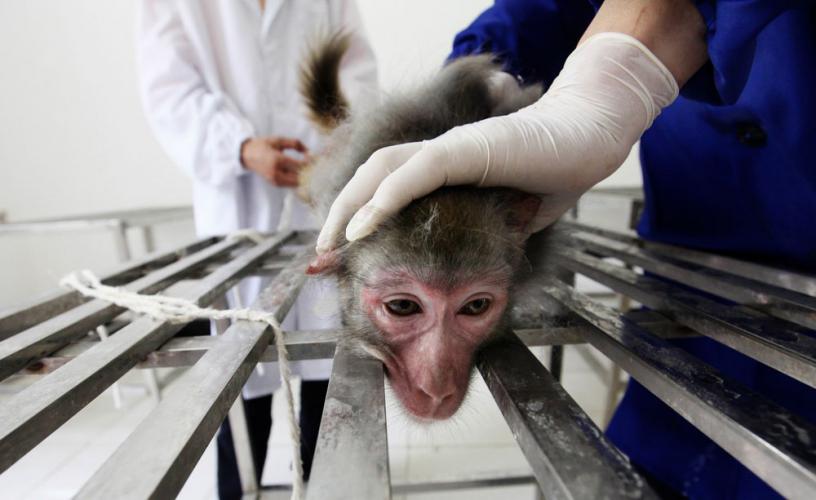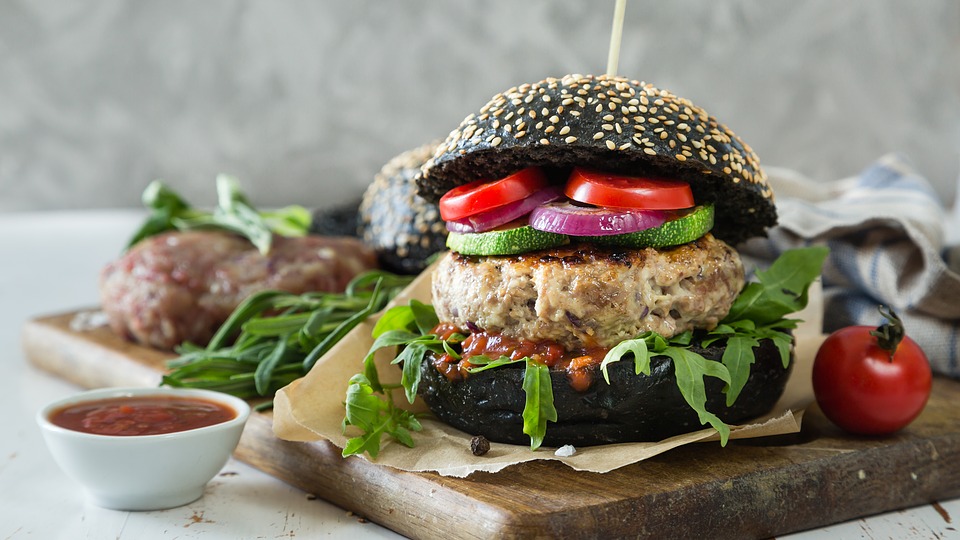Worldlog Marianne Thieme 1 Mayıs 2018
The 22nd of April was International Earth Day. On that day, people all over the world reflect on all the beauty of the earth. Such a day demonstrates well that the problems surrounding nature, environment and climate change are transboundary and that we should collaborate to tackle these problems. I see that such awareness is growing, wherever I go. Just recently, I was in Sweden and Germany to give lectures. I was invited to Sweden by our sister party Djurens parti and to Germany by a theological university. The lecture in Germany was attended by visitors from Georgia, Hungary, the Czech Republic and Ghana among others. It’s wonderful to see that increasingly more people from different backgrounds are demanding a different kind of politics: politics focussed on sustainability and compassion instead of economic growth.

Marianne during her lecture in Sweden
Together we are in strong position: This is also demonstrated by the fight against bullfighting. Thanks to an international campaign conducted by CAS International, the European Parliament decided in 2015 that the European Union must stop its subsidies for bullfighting. The Dutch Lower House already accepted our motion to stop those subsidies in 2013. The European Commission has, however, ignored the wish of the European Parliament for years. But the EU subsidy policy is currently being reviewed, so there’s a chance again that the European Commission will decide not to invest any more money in the bullfighting industry. On the 4th of April, CAS International protested against the current European subsidies, opposite the Lower House, and our MEP Anja Hazekamp attended this protest, together with our member of the Lower House, Femke Merel Arissen. You, as a citizen, can also help to pressure European policy makers: sign the petition against the European subsidies for bullfighting here !

Femke Merel and Anja Hazekamp of the Party for the Animals at the protest against subsidies for bullfighting
The 24th of April was World Lab Animals Day. Worldwide, the number of animals that are used in animal testing is estimated at 115 million every year, of which 12 million animals are used in Europe. The Netherlands even has the largest Primate Testing Lab of Europe, the BPRC. 1500 monkeys are used there in gruesome experiments. Some monkeys get electrodes placed in their heads while others are made ill with the most horrifying diseases. We have drawn attention to what’s happening to those monkeys but also to the millions of other animals that are pointlessly used as testing animals all over the world. The Dutch government has said before that the Netherlands must be frontrunner in research without animal testing. So, it’s odd that an institute such as BPRC is still open.
Certainly, in these times of quick innovations and technological developments, there are sufficient alternatives for animal testing, but our governments refuse to invest enough money into them. We keep pressuring the government and the EU to stop the cruelties in the animal testing industry!

Experiments on monkeys
Almost half of all grains and vegetable proteins that are grown all over the world are fed to farming animals. What a waste of farming land, water and food that humans could eat directly. Our huge meat consumption is decadent. Even the most mainstream institutes and companies are now aware of this. The authoritative institute the World Food Organisation already sounded the alarm bell because the livestock industry poses a threat to our food security, nature and the environment. This month, the Council for the Living Environment and Infrastructure (an important advisory council of the Dutch government) adopted an urgent advice: the livestock industry must be considerably decreased to be able to achieve the Paris climate objectives and consumers must make their contributions too by consuming less meat and dairy products.

Vegan burger
But despite this scientific advice of its own advisory council, the Dutch government is hiding its head in the sand again and is ignoring the advice. The government’s intense lobbying this month even achieved that Dutch veal meat can be exported to China again. One of the most climate-, environmentally and animal-unfriendly measures a government can take. But fortunately, we see that others do dare to contribute to a positive change for humankind, animals and the environment. Increasingly more companies and educational institutes aim at local, organic and vegetable products. Read here the article of The Guardian about how veganism is becoming more mainstream.
Until the next time!
Marianne
22 Nisan Dünya günüydü. Bu günde çeşitli ülkelerde dünyanın güzelliğini vurgulayan etkinlikler yapıldı. Böyle bir günde doğa, çevre ve iklim değişikliği konularının tüm dünyayı etkileyen büyük sorunlar olduğunu görüyoruz ve bu sorunların üstesinden gelebilmek için işbirliğinin ne kadar önemli olduğu bir kez daha karşımıza çıkıyor.
Bu konuda insanların giderek daha da bilinçlendiğine ben de bizzat şahit oluyorum. Yakınlarda bir dizi konferanslar vermek için Almanya ve İsveç’teydim. İsveç’e kardeş partimiz Djurens Partisi’nin ve Almanya’ya da Teoloji Üniversitesi’nin davetlisi olarak gittim. Almanya’daki konferansta Gürcistan, Macaristan, Çek Cumhuriyeti ve Gana’dan katılımcılar da vardı. Gün geçtikçe daha fazla sayıda, farklı kültürlerden insanların yeni bir politik akım arayışı içinde olduklarını görmek çok sevindirici: ekonomik büyüme yerine sürdürülebilirlik ve insan ve doğaya merhametli olmayı esas amaç edinmiş bir politik akım.

Birlikte daha güçlüyüz: bunu boğa güreşlerine karşı mücadelemizde de görüyoruz. CAS International’ın çabalarıyla yürütülen kampanya sayesinde 2015 yılında Avrupa Parlementosu boğa güreşlerine ayrılan ödeneğin kaldırılmasına karar verdi. 2013 senesinde Hollanda meclisi bizim sunduğumuz bu önergeyi kabul etmişti. Ne var ki Avrupa Komisyonu, Avrupa Parlementosu’nun bu dileğini görmez ve duymazdan geldi. Ancak şu anda Avrupa ödenek politikaları yeniden gözden geçiriliyor ve Avrupa Komisyonu’nun boğa güreşi endüstrisinden ödenekleri çekmek için yeni bir fırsatı var.
4 Nisan’da CAS International Hollanda Meclisi önünde bir protesto gösterisi yaptı. Avrupa Parlementerimiz Anje Hazekamp ve milletvekilimiz Femke Arissen de bu protestoya katıldılar. Siz de şu linkten imza kampanyamıza katılabilir ve bir vatandaş olarak Avrupa’nın geleceğine yön verenlere boğa güreşlerine ödeneklerin kesilmesi için baskı yapabilirsiniz.

Hollanda Hayvanları Koruma Partisi’nden Femke Merel ve Anja Hazekamp boğa güreşlerine ayrılan ödeneklerin kaldırılması için yapılan protestodaydı
24 Nisan Dünya Laboratuvar Hayvanları günüydü. Dünyada yılda yaklaşık 115 milyon hayvan deneyler için kullanılıyor. Bunların 12 milyonu Avrupa’da. Hatta Hollanda Avrupa’nın en büyük test maymun merkezi BPRCye ev sahipliği yapıyor. Burada yajlaşık 1500 maymunun üzerinde dehşet verici deneyler yapılıyor. Kimi maymunların kafalarına elektrodlar bağlanıyor, kimilerine de en ağır ve korkunç hastalıkların virüsleri veriliyor. Biz maymunların ve dünyada sanki değersiz bir bez parçasıymış gibi deneylerde kullanılar diğer milyonlarca laboratuvar hayvanının kaderlerinin ne olacağına dikkat çekmek istedik. Hollanda hükumeti daha önce 2025 yılına kadar Hollanda’nın araştırmalar için laboratuvar hayvanı kullanılmayan ülkeler listesinde başı çekmesi gerektiğini belirtmişti. Tabii bu durumda BPRC gibi bir kurumun hala açık olması inanılır gibi değil. Hele de günümüzde hayvanlar üzerinde deney yapılmasına gerek kalmayan bir çok teknik gelişme varken. Ancak maalesef hükumetlerimiz bu teknik gelişmelere yatırım yapma konusunda çekingen davranıyorlar. Biz bu acımasız deney hayvanları endüstrisine bir son verilmesi konusunda Hollanda hükumetine ve AB’ye baskı yapmaya devam edeceğiz.

Maymunlar üzerinde deney yapılıyor.
Dünyada yetiştirilen tahılların ve bitkisel proteinlerin yarısından fazlası çiftlik hayvanlarına veriliyor. Ne büyük bir tarım alanı, su ve gıda israfı! Bu proteinleri insanlar doğrudan yiyebilirler halbuki! Bu inalımaz miktarlarda et tüketimimiz, gerileyen bir akım olma yolunda. Hatta bu görüş giderek büyük gıda firmalarının da dikkatini çekiyor. Bu konudaki otorite Dünya Gıda Örgütü daha önce hayvancılık endüstrisinin gıda güvenliği, doğa ve çevre konularını tehdit ettiğine dikkatleri çekmişti. Bu ay da Hollanda hükümetine danışmanlık yapan Yaşam Alanları ve Altyapı Başkanlığı acil bir tavsiye ile geldi: “Besi hayvanlarının sayısı acilen azalmalı. Bu Paris anlaşmasının hedeflerine ulaşmamız için gerekli. Tüketiciler de bu konuya az et ve süt ürünleri tüketerek katkıda bulunabilirler. “

Vegan burger
Kendi tavsiye organının bu tavsiyesine rağmen Hollanda hükumeti yeniden kafasını kuma gömmeyi tercih etti. Hatta yoğun lobi çalışmaları sonucu hükumet bu ay Hollanda danalarının tekrar Çin’e ihraç edilmeleri konusunda anlaşmaya vardı. Bir hükumetin alabileceği en iklim, doğa ve hayvan düşmanı karar budur. Neyse ki başkalarının halen insan ve çevre konularına olumlu yatırımlar yaptıklarını görüyoruz. Gittikçe daha fazla şirket ve okul yerel, ekolojik ve bitkisel ürünlere yöneliyorlar. The Guardian gazetesinin veganizmin giderek daha popüler olması hakkındaki yazısını buradan okuyabilirsiniz.
Bir dahaki sefere kadar, hoşçakalın!
Marianne